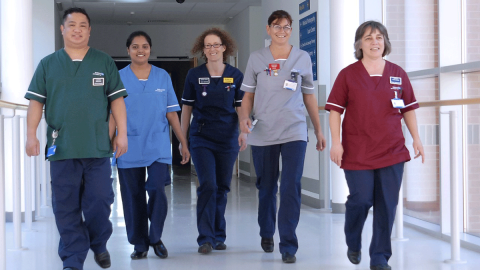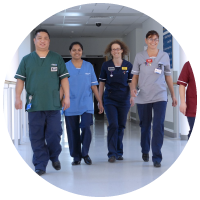NHS Supply Chain launches consultation with NHS staff on consistent uniform for England
NHS Supply Chain is today launching a seven week consultation about the potential introduction of a standardised national healthcare uniform for NHS staff working in clinical roles in England.
The organisation is keen to hear the views of healthcare assistants, nurses, midwives and allied health professionals working in hospital and non-hospital settings across the country on whether a culturally sensitive, national approach to uniforms should be taken – and if so, should all NHS trusts adopt it.

NHS Supply Chain’s specialist hotel services buying function currently offers a uniform contract which provides a compliant framework from which NHS trusts specify the design, style and colours. This has led to significant variation of uniform between different NHS trusts, with many styles, colours, embroidery and rank identifiers which could potentially be reduced to one shared style for all staff groups differentiated by 15 to 20 colours.
Benefits could include:
- Improved patient safety, supporting recommendations made in the 2013 Francis Inquiry
- Greater recognition of staff by patients and the public
- Improved view of professionalism in appearance by staff
- Development of a high performing, ethical and sustainable supply chain, with a single NHS brand across the patient care pathway, providing consistency across the whole of the NHS in England
- Offers the ability to plan for and react to increased uniform demand such as those experienced during the coronavirus pandemic.
The consultation document asks whether healthcare professionals working in hospital and non-hospital settings agree with a national uniform approach and if so, whether they think it should become mandatory, meaning all NHS organisations would be required to adopt it.
It also asks a set of questions about the garment style and features, to help identify the key aspects felt necessary for a uniform to be well designed and fit for purpose.
Ruth May, Chief Nursing Officer for England said: “Patients have told us that, for them, contact with several NHS professionals in a hospital and non-hospital setting can sometimes feel confusing, frequently due to not knowing who does which role. We want patients and the public to be able to easily identify which nursing, midwifery or care professional is providing their care. Keeping patients and staff safe is fundamental to this consultation so please have your say.”
Chief Allied Health Professions Officer for England Suzanne Rastrick added: “At this time of transformation and recovery, there is a huge opportunity to truly demonstrate the key contribution to care that allied health professionals make, alongside nursing and midwifery colleagues. We believe that a national, culturally sensitive uniform could potentially bring some major benefits: for patients, for staff and for the public…but your voices are critical to informing this so I urge you to complete the consultation document so your views are heard.”
Kevin Chidlow, Tower Director for NHS Supply Chain said: “This consultation is the chance for NHS staff working in hospitals and in the community across England and their representative bodies, to have their say on the potential creation of a fit for purpose, easy to wear, smart and comfortable uniform for the diverse and professional NHS workforce.
“We have developed a case for change which focuses on patient safety, professional image, equality, diversity and inclusion, value for money and sustainability. We welcome thoughts and insights from all healthcare professionals, which make up 60 percent of the whole of the NHS workforce.”
More details about the proposal are available including the consultation which closes on 31 May 2021.
Media Enquiries:
Notes to editors
NHS Scotland and NHS Wales introduced a nationally standardised uniform in 2010 and NHS Northern Ireland followed in 2011. NHS Wales currently has 154 product lines and NHS Scotland has 64, compared to 30,000 product lines in England.
Engagement carried out so far shows that patients and visitors are in favour of a national approach and would reduce confusion. An independent survey commissioned by NHS Supply Chain: Hotel Services of 509 patients across eight NHS trusts has shown:
- 88 percent of patients think that the same uniform should be worn nationally
- 79 percent of patients think that a strongly defined uniform helps them to identify key workers
- 55 percent of patients were unable to easily identify senior members of staff via their uniform.
Through workshops, engagement sessions, and more recently webinar and virtual sessions NHS Supply Chain has identified the uniforms should:
- Reflect the changing environment in hospitals and other care environments
- Have appropriate pockets and storage
- Be easy to care for
- Enable the wearer to present a friendly and approachable image to a wide range of different patients
- Reflect the diversity of the NHS whilst maintaining the strict infection control standards demanded.
The consultation document sets out three options for NHS Supply Chain: Hotel Services’ strategy:
- Continue with the current strategy of uniform designs being set at local trust level
- Source a standard uniform design, but allow trusts to opt in if they choose if the project was not fully adopted on a national basis
- Source a standard uniform design which is implemented across the NHS in England for all trusts.
About NHS Supply Chain
NHS Supply Chain manages the sourcing, delivery and supply of healthcare products, services and food for NHS trusts and healthcare organisations across England and Wales.
Managing more than 4.5 million orders per year, across 94,000 order points and 15,000 locations, NHS Supply Chain systems consolidate orders from over 800 suppliers, saving trusts time and money and removing duplication of overlapping contracts.
Lord Carter’s report into efficiency and productivity in the NHS, published in 2015, identified unwarranted variation in procurement across the NHS, resulting in the need to improve operational efficiencies to transform a fragmented procurement landscape. To undertake this transformation the Department of Health and Social Care established the Procurement Transformation Programme (PTP) to deliver a new NHS Supply Chain.
The new NHS Supply Chain was designed to help the NHS deliver clinically assured, quality products at the best value, through a range of specialist buying functions. Its aim is to leverage the buying power of the NHS to negotiate the best deals from suppliers and deliver savings of £2.4 billion back into NHS frontline services by the end of the financial year 2022/23.
The new model consists of eleven specialist buying functions, known as Category Towers, delivering clinical consumables, capital medical equipment and non-medical products such as food and office solutions. Two enabling services for logistics and supporting technology and transactional services which underpin the model.
Key benefits the NHS Supply Chain will bring NHS trusts and suppliers include:
NHS Trusts
- Savings channelled back to frontline services
- Releasing more time for core clinical activities
- Greater NHS clinical involvement in purchasing decision
- More effective introduction of new products.
Suppliers
- Lowering sales and marketing costs
- Single route into the national market
- A joined-up approach across the NHS
- Clear route for innovative products.
On 1 April 2018, a new commercially astute management function of the new NHS Supply Chain called Supply Chain Coordination Limited (SCCL) went ‘live’. The management function is responsible in driving strong commercial capability, providing a relentless approach to creating value, gain competitive advantage, become the strategic procurement partner of choice for the NHS, manage the delivery and performance of the Category Tower Service Providers and its enabling logistics and technology services whilst overseeing continuous improvement. SCCL is a limited company, wholly owned by the Secretary of State for Health and Social Care, SCCL is part of the NHS family. For more information on our category service tower providers go to https://www.supplychain.nhs.uk/categories/.
About CaPA
The Clinical and Product Assurance (CaPA) team of NHS Supply Chain is key to ensuring that all the products we supply are safe and reflect the needs and preferences of all our NHS partners.
This includes working with our NHS partners such as NHS England, NHS Improvement and the National Institute for Health and Care Excellence (NICE) to support the introduction of new technology and innovation into the supply chain that provides demonstrable benefits for our patients and users.
The CaPA team is responsible for three key areas of expertise:
- Assurance framework
- Patient safety
- Innovation.
For further information see here: https://www.supplychain.nhs.uk/about-us/clinical-and-product-assurance-capa/

